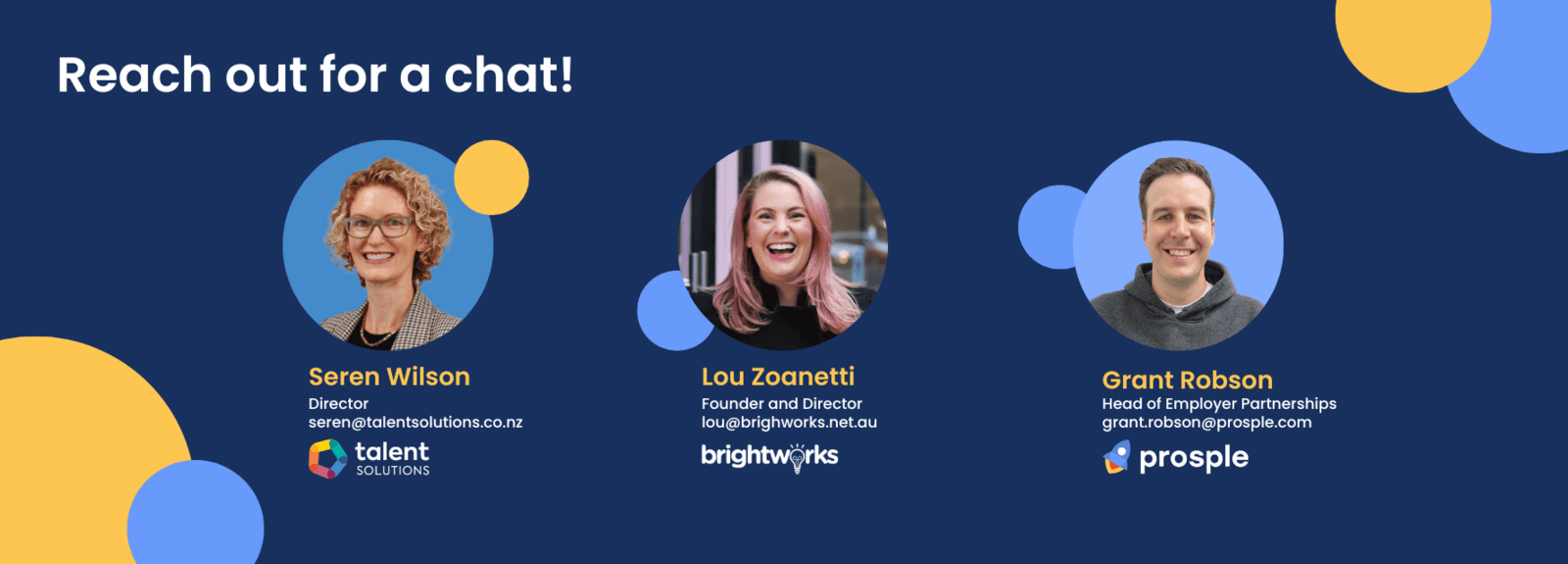
Grant Robson
Head of Employer Partnerships at Prosple

ChatGPT has taken the world by storm with users utilizing the technology for various use cases. Lou Zoanetti, Founder & Director of Brightworks, Seren Wilson, Co-Founder & Director of Talent Solutions, and Grant Robson, Head of Employer Partnerships at Prosple, discussed the implications of this new technology on the graduate recruitment industry.
What is ChatGPT?
What is ChatGPT?
Developed by the artificial intelligence (AI) company OpenAI, ChatGPT is an AI chatbot that can have conversations with real people. The chatbot can search the internet for text, build a statistical model, and then put words together in response to a specific query. Although the underlying technology has been available for a while, this was the first time OpenAI made its powerful GPT3 language-generating system available to the general public, sparking a competition among humans to come up with the most creative instructions.
What are the pros of ChatGPT?
What are the pros of ChatGPT?
Chat GPT is a pre-trained chatbot so it has a huge advantage to use, let’s have a look at the pros of this AI:
- You can get answers to your questions, fast!
- Unlike search engines like Google, when you ask it a question, ChatGPT will give you a direct answer to your questions, as opposed to a list of websites to research further
- It’s free (for now) - although OpenAI has recently launched a premium option for $ 20 USD per month
- It’s mostly accurate - do remember that it sources data from the internet up until September 2021.
- ChatGPT can respond consistently to frequently asked questions, ensuring all users receive the same information.
- it’s super easy to use - as it is pre-trained AI so it can do natural conversations and it can understand human behaviour
What are the limitations of ChatGPT?
What are the limitations of ChatGPT?
Like all new tech when it is first released – there are a few bugs and limitations.
- For ChatGPT, as the knowledge base cut-off is 2021 – it can’t provide you with specific information on recent information – although this will obviously improve over time.
- Very sensitive to input phrasing - adjusting your question even slightly can produce a very different response.
- Biased language: As with any machine learning model, ChatGPT is only as unbiased as the data it’s trained on. If the training data contains biased language, ChatGPT will also generate biased responses.
- Limited creativity: Although ChatGPT can generate responses that appear creative, it is ultimately limited by the data it has been trained on and may struggle to come up with truly novel ideas.
- Difficulty in long-term memory: ChatGPT’s ability to remember information is limited, so it may struggle to maintain coherence and consistency over long conversations.
What can you use ChatGPT for?
What can you use ChatGPT for?
Whether you're looking for quick answers to trivia questions or in-depth explanations of complex concepts, ChatGPT can be your go-to source for information.
1. Generate ideas and brainstorm
1. Generate ideas and brainstorm
Need ideas for a theme for your partner's upcoming birthday party? Or brainstorm a list of topics for your next blog post? ChatGPT can help! The AI can even generate recipe ideas or entire meal plans.
2. Get personalized recommendations
2. Get personalized recommendations
ChatGPT can act as your shopping assistant, health assistant, or even a cinema concierge that gives you song recommendations tailored to your specific likes and dislikes.
3. Bring in a writing assistant
3. Bring in a writing assistant
Ask ChatGPT what you’re writing about — whether it’s a poem, a news article, an email, or a blog on how ChatGPT could affect the graduate recruitment industry (wink). You’ll get customised content that you can use in a wide variety of situations.
4. Fetch data & research
4. Fetch data & research
Did you know ChatGPT can summarise research for you, including entire studies? You can provide some content and it will summarise that content for you.
5. Translate text
5. Translate text
Give ChatGPT your text, and it can translate it into 95 different languages!
What can a graduate applying to your job use ChatGPT for?
What can a graduate applying to your job use ChatGPT for?
Let’s think about how current university students and recent graduates could use the tool.
- Ask the tool to create a CV & cover letter
- Create code or fix code for an assignment or task
- Provide a list of the most common interview questions and how to answer them
- Research various companies to find out if they’d be a suitable fit for the candidate
- Answer cognitive questions in psych test
To demonstrate how useful the tool can be to help students, here’s a brief recording of how a candidate might use ChatGPT to help them develop a CV.
What are the implications for graduate recruiters?
What are the implications for graduate recruiters?
No doubt, ChatGPT and other AI tools on the horizon will shake up many jobs, sectors and how we go about our jobs and lives. For graduate recruiters, at least in the short term, it’s going to have an effect in various ways:
- More impetus to move away from CV and cover letters to application forms
- Increased use of psychometric assessments – particularly to assess for critical reasoning
- A return to in-person assessments and proctored assessments
- Referencing very recent policies or publications that ChatGPT cannot access (yet)
How can graduate recruiters use ChatGPT?
How can graduate recruiters use ChatGPT?
At its core, ChatGPT is just another tool in the toolbox, and it can be extremely beneficial if you know how to use it. Let’s step through some practical examples of how graduate recruiters could use the tool:
1. Job descriptions
1. Job descriptions
Job descriptions are often the first impression that a student gets about your company, so you ought to do it well! If you’re an accounting firm hiring graduates for various streams (tax, audit, consulting), instead of using the same job description in each job, why not use the tool to write tailored job descriptions for each practice area? You could start off with “write a job description for my firm's tax graduate program”. Then ask the tool to “make it relevant to Australia”. “Make it relevant to Gen Z by removing buzzwords”. And so on…
2. Job advertisements
2. Job advertisements
Graduate recruiters could ask the tool to provide creative ways to attract eyeballs online and on campus
3. Interview questions
3. Interview questions
New to your role and you’re not sure which interview questions to ask? You could ask Chat GBT “what interview questions should I ask candidates for a graduate tax position at our firm in New Zealand?”
4. Social media content
4. Social media content
Feeling a little stuck on how to promote your firm's opportunities on social media? Use the tool to help write a post that appeals to your target audience
5. Data and insights
5. Data and insights
Whilst the tool only has data up until September 2021, it’s still useful for research. You could ask it “tell me the number of māori students studying civil engineering degrees in New Zealand”
How to get the most out of ChatGPT?
How to get the most out of ChatGPT?
One key factor to consider is the way in which users communicate with it. Simple commands may not always suffice, with users needing to employ more nuanced prompts to achieve their desired outcomes.
1. Be very clear and specific
1. Be very clear and specific
The more specific your question, the better the answer. Although you can build on previous questions and ChatGPT will ‘remember’ what it has told you previously, try to be as specific as possible.
2. Consider the viewpoint that will be most useful to you
2. Consider the viewpoint that will be most useful to you
You can ask ChatGPT to review things with a particular lens – e.g. “review a CV for a graduate position as a graduate recruiter”.
3. Try to reframe questions in various ways
3. Try to reframe questions in various ways
To get different responses, you can ask ChatGPT to change the tone of voice or style. E.g. “write in a humous or serious manner”. You can keep requesting iterations until the finished product is what you’re looking for.
4. Check for accuracy!
4. Check for accuracy!
Remember, the data source ChatGPT uses is only up to 2021, so be mindful of that and fact-check! A lot changed in 2 years.
How will the education sector be affected by ChatGPT?
How will the education sector be affected by ChatGPT?
As Mike Abecina recently stated, “ChatGPT is on the brink of shaking up almost every aspect of the teaching and learning lifecycle and will be on the lips of the majority of educators and principals from day one.”
So, should it be banned from classrooms? Or integrated?
Put simply, the role of technology in the workplace is to eliminate the repetitive stuff. And let’s face it, teachers are busy, and students are tech-savvy. So the adoption of new technologies like ChatGPT in the classroom seems inevitable.
One thing that all educators are agreeing on though, is that ChatGPT will change the way that assessments are conducted and set in the short term.
To summarise
To summarise
No doubt, ChatGPT heralds a new era of AI language models. The tool will develop rapidly to overcome some of the early teething issues. Over the coming years, AI is likely to disrupt many industries, including graduate recruitment. Should we fear it? Personally, I think not. If anything, we as a graduate community should embrace new technologies, try and understand them, and discuss the impact and potential ramifications they may have on recruitment campaigns and processes.
Do you have questions or feedback? Feel free to get in touch with Seren, Lou or me. We’d love to hear from you and continue the conversation!


